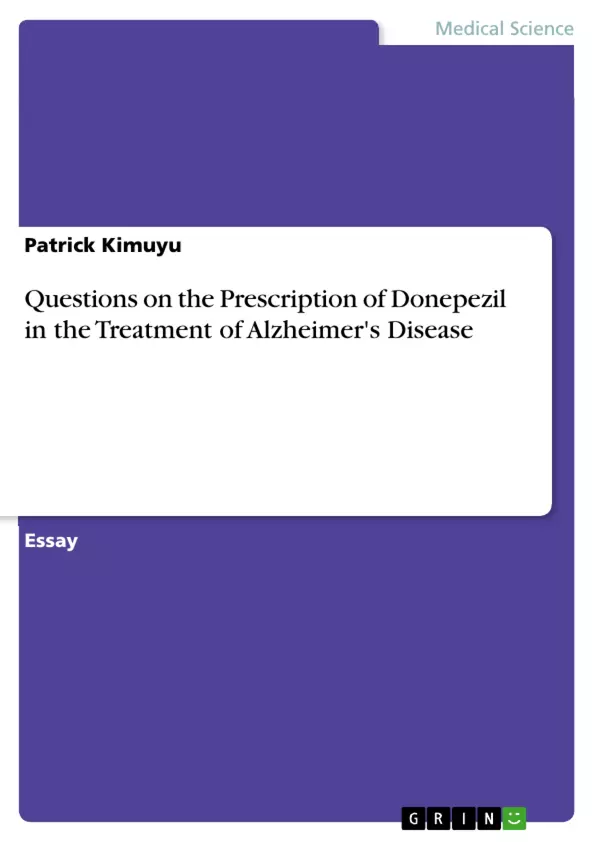This paper aims at seeking consensus whether Donepezil should be prescribed in preference to other available drugs for the treatment of Alzheimer’s disease. Donepezil is the generic name for the drug known by the brand name as Aricept. This drug has been in use for therapeutic purposes since its approval by FDA in 1996 in which it is used to treat memory loss (dementia) in patients suffering from Alzheimer's disease.
According to the pathophysiology of Alzheimer's disease, it has been documented that this disease is characterized with a brain disorder referred to as dementia. This condition affects the memory; thus, causing difficulties in communicating, thinking and remembering. It is also known to cause noticeable changes in personality and mood. Therefore, Alzheimer's disease causes inability in performing daily activities owing to the slow destruction of the memory.
It is for this clinical condition that Donepezil is used in order to improve mental function. Some of the most principal mental functions that are improved by Donepezil include memory, speaking, thinking, communicating, attention, and interpersonal interactions. Despite the ability of Donepezil to improve brain functioning by treating dementia, it is worth noting that this drug does not cure Alzheimer's disease.
Inhaltsverzeichnis (Table of Contents)
- Donepezil for Treating Alzheimer's Disease
- Pharmacology of Donepezil
- Alternative Drugs for Treating Alzheimer's Disease
- Side Effects of Donepezil and Alternative Drugs
- Contra-indications of Donepezil
- Formulation Issues
- Critical Analysis of Donepezil in Relation to Alternative Drugs
Zielsetzung und Themenschwerpunkte (Objectives and Key Themes)
This paper aims to explore the potential benefits of prescribing Donepezil for the treatment of Alzheimer's disease, comparing its effectiveness and characteristics with other available medications.
- Pharmacological Properties and Mechanism of Action of Donepezil
- Comparative Analysis of Donepezil with Alternative Medications
- Side Effects and Contra-indications of Donepezil
- Formulation and Dosage Considerations of Donepezil
- The Importance of Efficacy in Treating Alzheimer's Disease
Zusammenfassung der Kapitel (Chapter Summaries)
- This chapter provides an overview of Donepezil, its history, and its primary use in treating memory loss associated with Alzheimer's disease. It outlines the mechanism of action of this cholinesterase inhibitor.
- This section delves into the pharmacological properties of Donepezil, explaining how it inhibits the activity of acetylcholinesterase and its impact on the concentration of acetylcholine in the brain.
- This chapter compares Donepezil to alternative drugs for treating Alzheimer's disease, including galantamine, rivastigmine, tacrine, and memantine. It explores their similarities and differences in terms of their mode of action, efficacy, and side effects.
- This section focuses on the potential side effects of Donepezil and other Alzheimer's disease medications, highlighting common and severe adverse reactions.
- This chapter examines the contra-indications of Donepezil, outlining specific populations and disease conditions where its use is not recommended.
- This section discusses formulation considerations of Donepezil, comparing its availability and dosage forms to those of other medications.
- This chapter presents a critical analysis of Donepezil, evaluating its advantages and disadvantages in relation to alternative treatments for Alzheimer's disease.
Schlüsselwörter (Keywords)
This paper focuses on key topics such as Alzheimer's disease, Donepezil, cholinesterase inhibitors, memantine, drug efficacy, side effects, contra-indications, formulation, and dosage.
Frequently Asked Questions
What is Donepezil and what is it used for?
Donepezil (brand name Aricept) is a medication used to treat memory loss (dementia) in patients suffering from mild to moderate Alzheimer's disease.
How does Donepezil work in the brain?
It is a cholinesterase inhibitor that works by preventing the breakdown of acetylcholine, a chemical messenger in the brain important for memory and thinking.
Does Donepezil cure Alzheimer's disease?
No, Donepezil does not cure the disease. It aims to improve or stabilize mental functions like memory, attention, and interpersonal interactions for a period of time.
What are common side effects of Donepezil?
Common side effects can include nausea, diarrhea, insomnia, and muscle cramps. The paper provides a comparative analysis of these effects against alternative drugs.
What are the alternatives to Donepezil for Alzheimer's treatment?
Alternative medications include galantamine, rivastigmine, tacrine, and memantine, each with different modes of action and efficacy profiles.
- Quote paper
- Patrick Kimuyu (Author), 2018, Questions on the Prescription of Donepezil in the Treatment of Alzheimer's Disease, Munich, GRIN Verlag, https://www.grin.com/document/388474



